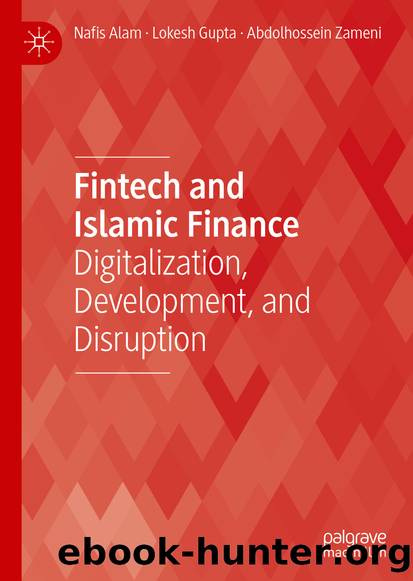Fintech and Islamic Finance by Nafis Alam & Lokesh Gupta & Abdolhossein Zameni

Author:Nafis Alam & Lokesh Gupta & Abdolhossein Zameni
Language: eng
Format: epub
ISBN: 9783030246662
Publisher: Springer International Publishing
5.2 Blockchain and Shariah Compliance
Blockchain and cryptocurrency is making inroads in financial sector including Islamic finance . Islamic financial institutions are jumping into the bandwagon, although in the early stage of catching up digitalization wave to offer efficiency, convenient and better experience to the customers. The buzzword is digitalization ; however, in practice it could be launching of new app such as mobile banking or could be new channel creation for customer acquisition or even automation of current processes or business models. There are now initiatives on the implementation of blockchain and use of cryptocurrency amongst Islamic financial institutions and it is still at very infancy stage. Islamic finance is governed by Shariah (Islamic jurisprudence) and the holy book “the Quran”, which goes beyond interest (ribah) free banking, speculative (gharar ) investments and is based on profit and return sharing principle.
There have been ongoing research and debate on the cryptocurrency compliance with Shariah principles and it differs amongst the scholars and depends on the specific country. Saudi Arabia is among the countries with a more positive attitude to crypto-assets and Dubai has become one of the most active hubs of crypto-asset technologies. Islamic law prohibits usury; cryptocurrencies however, are not created through debt, but are instead an actual real thing, like an apple, or a dinar coin, or in this case a piece of code which cannot be faked and cannot be replicated. This makes Bitcoin even more appealing than current money as far as Shariah law is concerned (Trustnodes 2018). Similar observations were made by Martin and Blossom’s internal Shariah advisor and Shariah compliance officer, Mufti Muhammad Abu Bakar, who published a study that concludes Bitcoin does qualify as Islamic money, unless a local government forbids the use of digital currencies (Abu Bakar 2018). The scholars made observation on Bitcoin as haram or illegal/impermissible in Islamic law, which is based on the principle of gharar (uncertainty). This is based on reasoning that the value of Bitcoin is speculative (Qimar), it is unclear what a person is buying and what the outcome of the entire Bitcoin value is going to be (Abu Sammy, 2018). There is another opinion stating that Bitcoin would qualify as a digital asset (maal) which possesses value (taqawwum). From a purely fiqh and Islamic law perspective, investing in Bitcoin and the return could be considered lawful (Faraz Adam 2017). Opinions are divided amongst Islamic scholars; however by and large, it can be observed that the acceptance of cryptocurrency is increasing.
The Islamic finance products and services are governed by Shariah principles, that is, trust , equality and fairness. Blockchain technology platform also offers the same principle and is perfectly embedded with Islamic values of trust , justice, equality and efficiency into banking and financial transactions, promoting the true spirit of the Shariah. There are similarities between the blockchain features and Islamic finance principles, which opens up the door for Islamic financial Institutions to embrace it and apply it in various Islamic financial business models. The early adoption
Download
This site does not store any files on its server. We only index and link to content provided by other sites. Please contact the content providers to delete copyright contents if any and email us, we'll remove relevant links or contents immediately.
International Integration of the Brazilian Economy by Elias C. Grivoyannis(57288)
The Radium Girls by Kate Moore(10902)
Turbulence by E. J. Noyes(7032)
Nudge - Improving Decisions about Health, Wealth, and Happiness by Thaler Sunstein(6629)
The Black Swan by Nassim Nicholas Taleb(6184)
Pioneering Portfolio Management by David F. Swensen(5599)
Rich Dad Poor Dad by Robert T. Kiyosaki(5140)
Zero to One by Peter Thiel(4817)
Man-made Catastrophes and Risk Information Concealment by Dmitry Chernov & Didier Sornette(4728)
Secrecy World by Jake Bernstein(3773)
Millionaire: The Philanderer, Gambler, and Duelist Who Invented Modern Finance by Janet Gleeson(3565)
Skin in the Game by Nassim Nicholas Taleb(3456)
The Age of Surveillance Capitalism by Shoshana Zuboff(3411)
The Money Culture by Michael Lewis(3276)
Skin in the Game: Hidden Asymmetries in Daily Life by Nassim Nicholas Taleb(3259)
Bullshit Jobs by David Graeber(3173)
The Dhandho Investor by Mohnish Pabrai(3162)
The Wisdom of Finance by Mihir Desai(3069)
Blockchain Basics by Daniel Drescher(2884)
